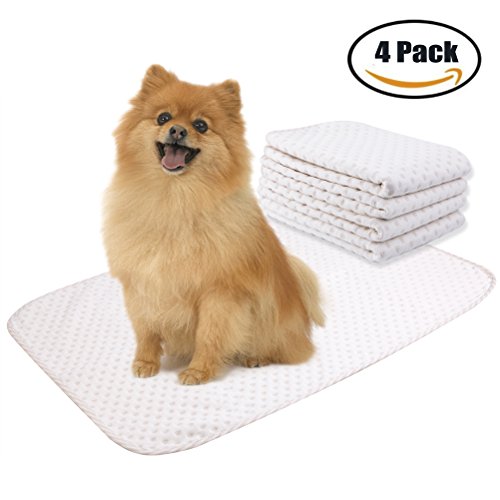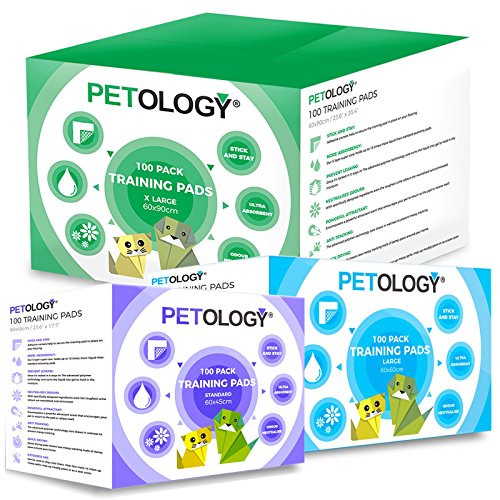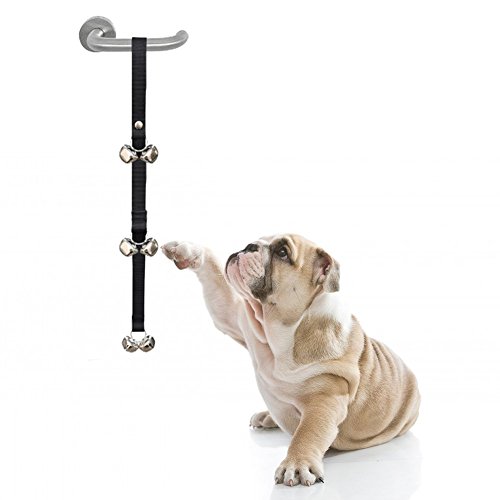
Below is a list of things that you will need to buy in order to raise a happy, healthy, and safe puppy, along with a brief description of each one.
Bedding
To ensure your puppy is comfortable when resting/sleeping, you should buy a bed that is large enough for the puppy to grow into and stretch out in. The type of bedding used is just as important, and there are many types available online and in pet stores.
One of the most popular is a synthetic simulated sheepskin known as a 'vetbed'. Benefits include it being machine washable, hygienic, non-allergic and relatively resistant to chewing.
Dog Collars
When it comes to choosing the most comfortable and suitable collar for a puppy, the breed, size and age of the puppy need to be taken into account. Collars should be checked on a daily basis to make sure they aren't damaged, are still secure, and still fit well, as puppies grow at a considerable rate and collars can quickly become too tight. If you can't slip two fingers underneath the collar while your pup is wearing it, then it is too tight and needs adjusting/replacing.
Puppy Crates
Puppy crates can be very useful for containing a puppy and keeping him or her safe and out of trouble when left alone. In order to ensure your puppy is comfortable and happy with their play area, you need to:
- Buy a crate big enough for the puppy to grow into. The puppy should be able to sleep stretched out and stand up when fully grown without any discomfort.
- Place some bedding inside along with some toys and occasional treats so that your puppy learns to enjoy going in there.
- Place the puppy inside whenever it falls asleep.
- Leave the door open until the puppy is comfortable being in there but close it when it is being fed and when it sleeping.
- Let it out of the crate as soon as it wakes up or finishes its meal.
- Take it for regular toilet intervals to ensure it doesn't empty its bladder and bowels inside the crate. Puppies can become very distressed if they have to foul near their beds. Any mishaps that do occur should be cleaned out immediately.
- Remove the puppy's collar when putting it in the crate to avoid it getting caught.
- Only leave their puppy in the crate for a maximum of two hours during the daytime to begin with, but this time can gradually be increased over the next few weeks.
Leads
As with dog collars, choosing a suitable lead depends on the size and breed of the puppy. A good lead should be strong and have a comfortable grip but never be too long, too short or too heavy. There are chain leads which may be more useful if your puppy enjoys to chew or carry the lead in his or her mouth, but they are more weighty. Alternatives are nylon leads and the traditional leather lead. The latter needs to be oiled or saddle soaped to be kept clean and supple.
Once a suitable lead has been chosen, it is important for owners to make sure they attach it to the 'D ring' of the collar and not onto the weaker split ring that attaches the identity disc (see below) to the collar.
Identity Discs
UK law requires all dog owners to inscribe their name and address on the dog's collar or on a plate or disc attached to it. Failure to follow this legislation can result in a fine of up to £5,000, regardless of whether the puppy is microchipped (see below) or not. Owners may also choose to give a telephone number although this is not legally required.
Microchipping
Having a puppy microchipped is a very sensible and useful safety precaution for owners. Dogs that are found after being reported lost or stolen can then be scanned by an authorised agent such as a vet, dog warden or rescue centre and handed back to their owner. See the microchipping guide for more information.
Interesting Toys
To help minimise chewing on your things or your furniture, you should provide your puppy with a range of appropriate toys to play with. Chew toys provide mental stimulation for your puppy, allow them to exercise their jaws and can help keep their teeth clean.
Toys such as Frisbees and balls on ropes encourage interactive play between you and your puppy, and give you a fun way to connect.
However you have to make sure that the toys you purchase are safe for your puppy. A puppy can easily choke on a toy that is too small or other small items such as golf or squash balls, whilst other items may cause harm by splintering. Chew toys can also become dangerously small after a prolonged period of chewing wearing them down.
Kennels
Most dogs are social animals, and enjoy the physical and emotional comforts of living with people inside the home. However, some can live outside, and benefit from it.
If your dog is one of these, you need to make sure that he or she has access to a kennel to take shelter in and to be comfortable in.
They will need an enclosed run and a kennel filled with toys. This will help to stop your puppy getting mischievous in the garden, and help to prevent any separation anxiety in the future.
Water and Food Bowls
Puppies need separate (non-tip) bowls for water and food. You must ensure that fresh water is always available for your puppy, but stick to specific, scheduled feeding times. See the feeding a dog guide for more information.
Car Travel
When travelling with a puppy in the car, owners should ensure a dog guard is placed in front of their puppy and secured with a car seat harness. Ideally, a crate or fixed cage should be used as both provide a dog with its own sufficient space and ensure it is fully protected while in the car.We have a travelling with a dog guide to help you get your puppy accustomed to travelling around.
Poo Bags
Under the Clean Neighbourhoods & Environment Act 2005, dog owners are legally required to clean up any poo left by their dog in public areas. Waste should be put into poo bags, sandwich bags or nappy sacks and disposed of in an appropriate bin. You need to make sure that you have a large supply of these bag to carry with you whenever you're venturing out with your puppy so you are not caught short.
Clothing
Some puppies may benefit from wearing a fitted jumper or coat when taken for a walk, especially if they are short coated or have recently been clipped / trimmed.
Protective clothing for long coated dogs is available to help keep them clean and dry in the winter. If you buy some clothing for your dog, you need to make sure that it is well tolerated by your puppy and that they are comfortable in it. Outdoor clothing should never be allowed to be worn indoors.
Puppy Oral Care
Looking after a puppy's oral health is essential in helping to prevent gum disease, which can lead to a number of health problems developing. Special canine toothpaste is available in a range of different flavours. Unlike toothpaste designed for people, canine toothpaste does not foam in the mouth, which is useful as a dog cannot rinse their mouth out or spit.
Human toothpaste can be poisonous for dogs, so you shouldn't use yours on your puppy. Check our guide for more information on dog tooth care.
Buy Essential Puppy Care Products














